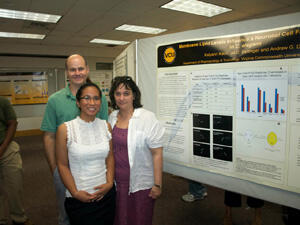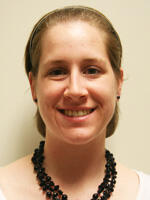April 2, 2012
April Student Features
Share this story
Undergrad Students to Present Basic Research Findings at National Conference

Both Angelica De Jesus, a senior working towards two degrees – a B.A. in Theatre Arts and a B.S. in psychology with a minor in biology – and Kalyann Kauv, a junior biology major, will present their research findings to peers in the scientific community during the annual American Society for Biochemistry and Molecular Biology (ASBMB) meeting, which is being held from April 21-25 in San Diego, Calif.
De Jesus, who also is a pre-med student, will present a poster titled, “Contribution of β2 subunit containing nicotinic acetylcholine receptors to anxiety-like behaviors in male mice using a novel model of anxiety.” She collaborated with Darlene H. Brunzell, Ph.D., assistant professor, and Shawn M. Anderson, a doctoral candidate, both in the VCU Department of Pharmacology and Toxicology.
De Jesus’ work examines the neural mechanisms behind the “feeling of release” that many nicotine addicts report as they smoke a cigarette. People suffering from anxiety disorders have been found to smoke cigarettes at a higher rate than those unaffected by anxiety, she said. Her research aims to better understand how specific nicotine receptors function.
Kauv will participate in a poster and oral presentation on her work titled, “Membrane Lipid Composition Influences a Neuronal Cell Fate Decision in C. elegans.” Her mentors on the work include Jill C. Bettinger, Ph.D., assistant professor, and Andrew G. Davies, Ph.D., assistant professor, both in the VCU Department of Pharmacology and Toxicology.
Kauv’s work examines how changes of the lipid bilayer composition of one neuronal cell during development can cause developmental effects within the nervous system. The model organism used was Caenorhabditis elegans, a non–parasitic, transparent roundworm approximately 1 mm in length. C. elegans was used as the model organism because it shares similarities to the mammalian brain and contains a simple, well-characterized nervous system.
Kauv is also one of seven students in the country to receive a travel award from the National Science Foundation to support her participation in the conference. The National Science Foundation award recognizes high quality, outcome-oriented undergraduate research in the fields of biochemistry and molecular biology.
Senior Selected for D.C. 'Posters on the Hill' Presentation

Victoria Hribar, a senior biomedical engineering and mathematical sciences major, has been selected to participate in the Council on Undergraduate Research’s annual “Posters on the Hill,” program at Capitol Hill, which recognizes the achievements of 75 undergraduate students from around the country each year.
Hribar will visit Washington, D.C., next week to share her research with members of Congress, congressional staff members, federal government officials and others.
Hribar has spent the past 11 months participating in the VCU Undergraduate Research Opportunity Program (UROP). With the guidance of her mentor, Dianne Pawluk, Ph.D., assistant professor of biomedical engineering, Hribar was able to continue her research on haptic art displays, which she started in May 2010 through the Howard Hughes Medical Institute Science Education and Research Program.
Hribar’s haptic art display is comprised of two major components – a thermal element and a tactile element – which will help users understand information about the texture, color, contrast and, in a sense, the emotional content of the painting. Hribar recognizes that these concepts in art are lost when it comes to the visually impaired and blind.
Read more about Hribar’s work at http://www.news.vcu.edu/news/Hribar.
Honors College Student Wins Writing Contest

Nikita Jathan, a second-year Honors College student, won first place in the Virginia Outdoor Writers Association, Inc. (VOWA), 2011-12 Annual Collegiate Undergraduate Writing Contest.
Jathan, who is from Cary, N.C., is majoring in environmental studies and biology with minors in chemistry and creative writing. Jathan’s winning essay,” Big Dreams,” recounted a trip to Thailand and the experience she had of touching an elephant for the first time – a longtime dream of hers. The theme for the contest was a memorable outdoor experience or special interest.
VOWA is a coalition of writers, photographers and video/film producers who explore subjects related to the outdoors and its enjoyment and conservation. VOWA announced its award-winners on March 28 at its annual meeting in Charlottesville. Judges for the contest were Richard Johnstone and Bill Sherrod, editors of Cooperative Living Magazine, and Marika Byrd, a freelance writer. Winners read their essays to association members at an awards luncheon. They received cash prizes and student membership in VOWA.
VCU Nursing Ph.D. Student Named Jonas Scholar

VCU nursing student and registered nurse Kristin Filler is one of 142 nursing doctoral candidates nationwide selected for the Jonas Nurse Leaders Scholar Program of the Jonas Center for Nursing Excellence.
The mission of the program is to increase the number of doctorally prepared faculty available to teach in nursing schools nationwide.
Filler is enrolled in the Post-B.S to Ph.D. option of VCU Nursing’s doctoral program. She is the first VCU School of Nursing student to participate in the program, and she will be mentored by Debra Lyon, Ph.D., chair of VCU’s Department of Family and Community Health Nursing.
Scholars receive $10,000 in financial support from the Jonas Center, with a match from their academic institution. Launched in 2008 with six scholars in three states, the Jonas Scholars program now includes more than 200 students in nearly 85 schools across the U.S.
----
Subscribe to VCU News
Subscribe to VCU News at newsletter.vcu.edu and receive a selection of stories, videos, photos, news clips and event listings in your inbox.







